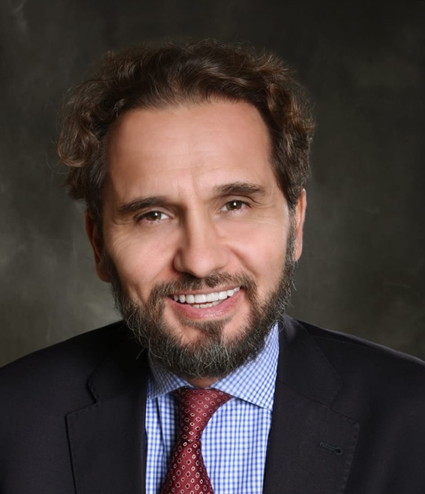No CrossRef data available.
Article contents
Interview with His Royal Highness Prince Mired bin Raad Zeid Al-Hussein of Jordan
Published online by Cambridge University Press: 24 November 2022
Abstract
 Born in Amman on 11 June 1965, His Royal Highness Prince Mired Raad Zeid Al-Hussein earned his BA degree from Tufts University in 1987 and his MA degree from the Fletcher School of Law and Diplomacy in 1995, with a specialization in international relations/strategic studies. He continued his education at Cambridge University, England, where he received an MPhil in historical studies in 1998. In addition, Prince Mired attended the British Royal Military Academy Sandhurst in 1990 and served for several years in the Jordanian Armed Forces, reaching the rank of Lieutenant Colonel.
Born in Amman on 11 June 1965, His Royal Highness Prince Mired Raad Zeid Al-Hussein earned his BA degree from Tufts University in 1987 and his MA degree from the Fletcher School of Law and Diplomacy in 1995, with a specialization in international relations/strategic studies. He continued his education at Cambridge University, England, where he received an MPhil in historical studies in 1998. In addition, Prince Mired attended the British Royal Military Academy Sandhurst in 1990 and served for several years in the Jordanian Armed Forces, reaching the rank of Lieutenant Colonel.
Upon leaving the military, Prince Mired decided to continue serving his country by other means, dedicating his life to humanitarian and social causes. He has been the Chairman of the National Committee for Demining and Rehabilitation since 2004, and from November 2007 to November 2008 he was President of the Eighth Meeting of States Parties to the Anti-Personnel Mine Ban Convention. He has also served as the Special Envoy of the Convention since 2009 and has had the honour and privilege of travelling the world advocating for further accession by countries that have not yet acceded to the Convention, as well as calling for the implementation of the Convention's articles by the States that have done so.
Prince Mired is also President of the Hashemite Commission for Disabled Soldiers, a position he has held since 2000. Over the course of the last two decades, the Commission has been able to provide a wide variety of different services, acting as a support network to all servicemen and servicewomen with disabilities in the Kingdom.
In addition, from 2008 through to 2013, Prince Mired served as Vice-President of the Higher Council for the Affairs of Persons with Disabilities, and in 2014 he was appointed by Royal Decree to serve as its President, succeeding his father, HRH Prince Raad Bin Zeid. In 2017, with the passing of groundbreaking new legislation calling for the rights of persons with disabilities, the Council was renamed as the Higher Council for the Rights of Persons with Disabilities. Prince Mired also served a short stint as President of the Jordanian Paralympic Committee from 2017 to 2018.
On 28 February 2021, in addition to all his aforementioned responsibilities, Prince Mired was appointed by Royal Decree as Chief Chamberlain to His Majesty King Abdullah II Ibn Al-Hussein of Jordan.
Prince Mired is married to HRH Princess Dina Mired. They have three children, Shirin, Rakan and Jafar.
Keywords
- Type
- Interview
- Information
- International Review of the Red Cross , Volume 105 , Issue 922: Persons with disabilities in armed conflict , April 2023 , pp. 28 - 37
- Copyright
- Copyright © The Author(s), 2022. Published by Cambridge University Press on behalf of the ICRC
Footnotes
Interview conducted by Bruno Demeyere, Editor-in-Chief of the Review.
The advice, opinions and statements contained in this article are those of the author/s and do not necessarily reflect the views of the ICRC. The ICRC does not necessarily represent or endorse the accuracy or reliability of any advice, opinion, statement or other information provided in this article.
References
1 International Disability Alliance, “All Commitments Made by Jordan['s] Higher Council for the Rights of Persons with Disabilities”, available at: www.internationaldisabilityalliance.org/commitments/stakeholder/jordan-higher-council-rights-persons-disabilities (all internet references were accessed in November 2022).
2 Law No. 20 on the Rights of Persons with Disabilities, 2017, available at: http://hcd.gov.jo/en/content/law-rights-persons-disabilities-no-20-year-2017.
3 Convention on the Rights of Persons with Disabilities, UNGA Res. 61/106, 24 January 2007 (entered into force 3 May 2008).
4 HRH Prince Mired R. Z. Al-Hussein, “Editorial: The Challenge of Managing Mine Action in Jordan”, Journal of Conventional Weapons Destruction, Vol. 23, No. 2, 2019, available at: https://commons.lib.jmu.edu/cgi/viewcontent.cgi?article=2864&context=cisr-journal.
5 The National Committee for Demining and Rehabilitation, the Hashemite Commission for Disabled Soldiers and the Higher Council for the Rights of Persons with Disabilities.
6 Convention on the Prohibition of the Use, Stockpiling, Production, and Transfer of Anti-Personnel Mines and on Their Destruction, UNGA Res. 52/38, 3 December 1997 (entered into force 1 March 1999).
7 Hadeel Al Rawabdeh, “Disabled Syrian Children in Jordan: Exclusion from Education Exacerbates the Difficulties of Asylum”, Syria Direct, 13 April 2021, available at: https://syriadirect.org/disabled-syrian-children-in-jordan-exclusion-from-education-exacerbate-the-difficulties-of-asylum/.
8 Higher Council for the Rights of Persons with Disabilities, “A Memorandum to Facilitate the Access of Persons with Disabilities to Rehabilitation Services in Health Centres”, 24 August 2021, available at: https://tinyurl.com/mx5ja8x7.
9 “Prince Mired Meets UNESCO Jordan Representative”, Jordan Times, 10 August 2021, available at: www.jordantimes.com/news/local/prince-mired-meets-unesco-jordan-representative.
10 Higher Council for the Rights of Persons with Disabilities, “The Supreme Council and the Ministry of Health: Repeal the Phrase ‘Unfit to Work’ for Persons with Disabilities”, 2 May 2021, available at: https://tinyurl.com/5hd5fjyt.
11 Higher Council for the Rights of Persons with Disabilities, “Iraqi Delegation Briefed on the Kingdom's Experience in the Field of the Rights of Persons with Disabilities”, 1 August 2021, available at: https://tinyurl.com/54wsm5we.
12 Law No. 20, above note 2, Art. 27.


